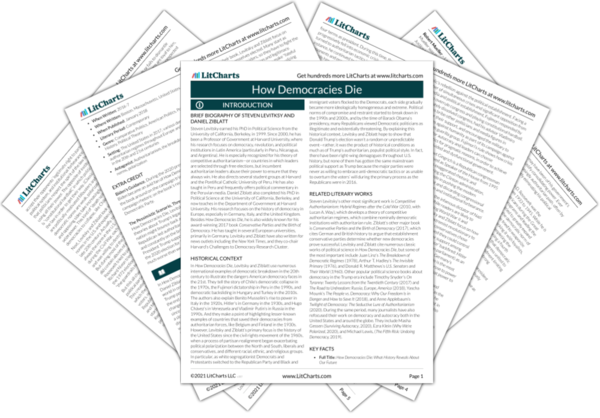Mutual Toleration Quotes in How Democracies Die
Mutual toleration refers to the idea that as long as our rivals play by constitutional rules, we accept that they have an equal right to exist, compete for power, and govern. We may disagree with, and even strongly dislike, our rivals, but we nevertheless accept them as legitimate. This means recognizing that our political rivals are decent, patriotic, law-abiding citizens—that they love our country and respect the Constitution just as we do. It means that even if we believe our opponents’ ideas to be foolish or wrong-headed, we do not view them as an existential threat. Nor do we treat them as treasonous, subversive, or otherwise beyond the pale. We may shed tears on election night when the other side wins, but we do not consider such an event apocalyptic. Put another way, mutual toleration is politicians’ collective willingness to agree to disagree.

Unlock explanations and citation info for this and every other How Democracies Die quote.
Plus so much more...
Get LitCharts A+Mutual toleration and institutional forbearance are closely related. Sometimes they reinforce each other. Politicians are more likely to be forbearing when they accept one another as legitimate rivals, and politicians who do not view their rivals as subversive will be less tempted to resort to norm breaking to keep them out of power. Acts of forbearance—for example, a Republican-controlled Senate approving a Democratic president’s Supreme Court pick—will reinforce each party’s belief that the other side is tolerable, promoting a virtuous circle.
But the opposite can also occur. The erosion of mutual toleration may motivate politicians to deploy their institutional powers as broadly as they can get away with. When parties view one another as mortal enemies, the stakes of political competition heighten dramatically. Losing ceases to be a routine and accepted part of the political process and instead becomes a full-blown catastrophe. When the perceived cost of losing is sufficiently high, politicians will be tempted to abandon forbearance. Acts of constitutional hardball may then in turn further undermine mutual toleration, reinforcing beliefs that our rivals pose a dangerous threat.
Polarization can destroy democratic norms. When socioeconomic, racial, or religious differences give rise to extreme partisanship, in which societies sort themselves into political camps whose worldviews are not just different but mutually exclusive, toleration becomes harder to sustain. Some polarization is healthy—even necessary—for democracy. And indeed, the historical experience of democracies in Western Europe shows us that norms can be sustained even where parties are separated by considerable ideological differences. But when societies grow so deeply divided that parties become wedded to incompatible worldviews, and especially when their members are so socially segregated that they rarely interact, stable partisan rivalries eventually give way to perceptions of mutual threat. As mutual toleration disappears, politicians grow tempted to abandon forbearance and try to win at all costs. This may encourage the rise of antisystem groups that reject democracy’s rules altogether. When that happens, democracy is in trouble.
The norms sustaining our political system rested, to a considerable degree, on racial exclusion. The stability of the period between the end of Reconstruction and the 1980s was rooted in an original sin: the Compromise of 1877 and its aftermath, which permitted the de-democratization of the South and the consolidation of Jim Crow. Racial exclusion contributed directly to the partisan civility and cooperation that came to characterize twentieth-century American politics.
[…]
The process of racial inclusion that began after World War II and culminated in the 1964 Civil Rights Act and 1965 Voting Rights Act would, at long last, fully democratize the United States. But it would also polarize it, posing the greatest challenge to established forms of mutual toleration and forbearance since Reconstruction.
Where a society’s political divisions are crosscutting, we line up on different sides of issues with different people at different times. We may disagree with our neighbors on abortion but agree with them on health care; we may dislike another neighbor’s views on immigration but agree with them on the need to raise the minimum wage. Such alliances help us build and sustain norms of mutual toleration. When we agree with our political rivals at least some of the time, we are less likely to view them as mortal enemies.












